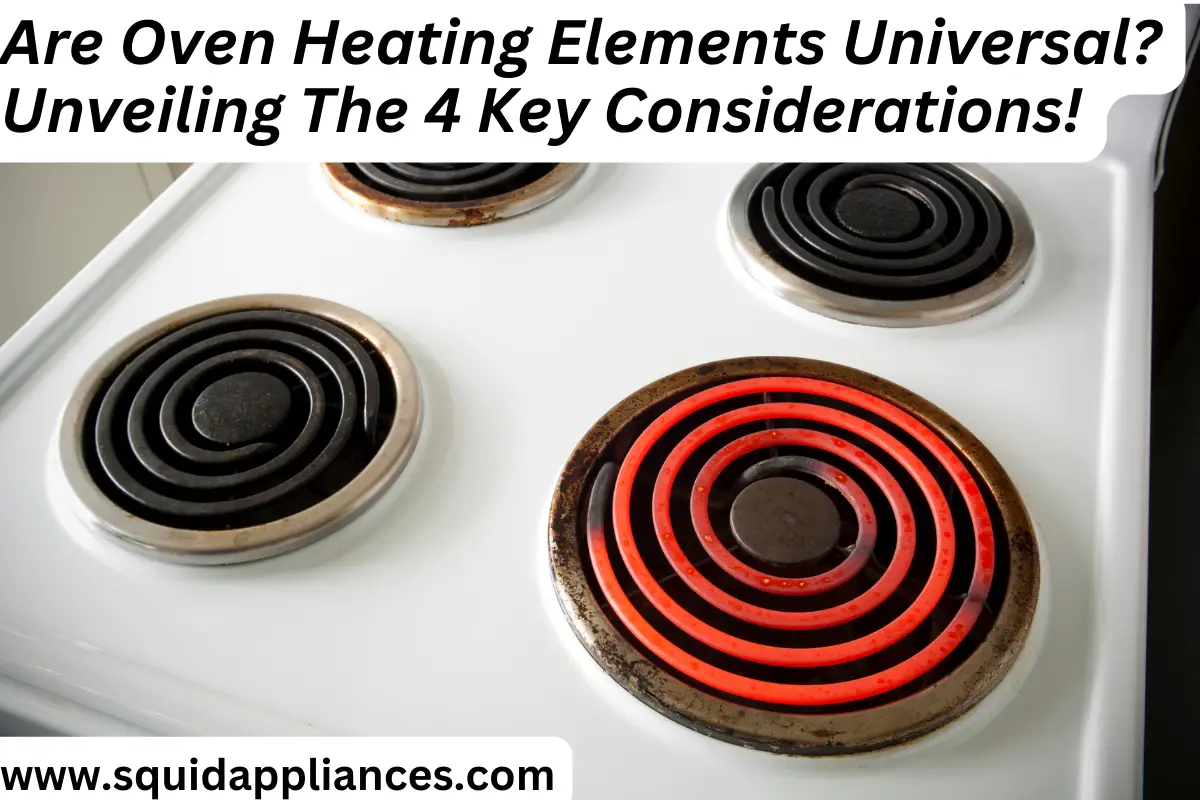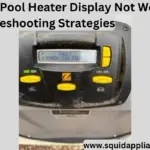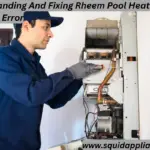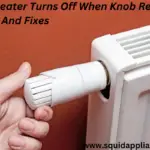Are oven heating elements universal?
This is a question that many homeowners find themselves asking when it comes time to replace their oven’s heating element. The answer, however, is not as straightforward as one might think.
There are four key considerations that must be taken into account in order to determine whether or not a particular heating element will be compatible with your specific oven.
The first consideration is wattage and voltage requirements. Different ovens have different power needs, so it’s important to ensure that the replacement heating element matches the electrical specifications of your appliance.
Size and dimension compatibility is also crucial. Not all ovens are created equal, and neither are their heating elements. It’s essential to select a replacement element that fits properly within the confines of your oven.
Another factor to consider is the type of heating element needed for your specific cooking needs. Are you looking for a coil, broil, or bake element? Each serves a different purpose within the oven and requires careful consideration before making a purchase.
Finally, brand and model compatibility should be taken into account. Some manufacturers design their appliances with proprietary parts that may not be interchangeable with other brands or models.
In this article, we will delve deeper into these four key considerations to help you make an informed decision when replacing your oven’s heating element. By understanding these factors, you can ensure that you find the perfect fit for your appliance while maintaining safety and functionality in your kitchen.
Are Oven Heating Elements Universal?
Yes, oven heating elements aren’t universal. Compatibility depends on wattage, size, type, and brand. Wattage and voltage must match for efficiency. Proper fit and type (like coil or bake) ensure functionality. Brand and model compatibility is crucial for seamless installation. Following safety measures during replacement is essential for a successful upgrade.
Key Takeaways
- Oven heating elements are not universal and compatibility depends on several factors.
- Four key considerations for determining compatibility are wattage and voltage requirements, size and dimension compatibility, heating element type, and brand and model compatibility.
- Different ovens have different power needs, so it’s important to match the electrical specifications of the replacement heating element.
- Proper fit within the oven is crucial for size and dimension compatibility.
Wattage and Voltage Requirements
Are oven heating elements universal? Let’s delve into the crucial factors, starting with wattage and voltage requirements.
When it comes to heating element efficiency, it’s important to consider the wattage and voltage needed for optimal performance. Higher wattage elements can heat up faster and maintain a consistent temperature, while lower wattage ones may take longer.
Additionally, energy consumption varies depending on the wattage and voltage, so choosing the right combination is key for efficient operation.
Size and Dimension Compatibility
Discovering if oven heating elements have size and dimension compatibility is essential for a seamless cooking experience that will leave you feeling confident and satisfied. When installing a new heating element, it’s crucial to consider the dimensions of your oven cavity to ensure a proper fit.
Failure to do so can result in an inefficient installation process or potential hazards such as overheating or electrical malfunctions. Take measurements carefully and consult the manufacturer’s guidelines for a safe and successful replacement.
Heating Element Type (e.g., coil, broil, bake)
The different types of heating elements in an oven, such as coil, broil, and bake, each offer unique cooking capabilities that can elevate your culinary creations to new heights. When considering the heating element type for your oven, it is important to take into account the material used for the heating element and its lifespan.
Different materials like nichrome or calrod can affect the performance and durability of the heating element over time.
Brand and Model Compatibility
When choosing a brand and model for your oven, it’s important to ensure compatibility between the different components. Brand compatibility refers to whether the heating element is designed to work with a specific brand of oven.
Model compatibility, on the other hand, pertains to whether the heating element is compatible with a particular model within that brand.
It’s crucial to check these factors before purchasing a new heating element to avoid any issues or complications during installation and use.
Installation and Safety Considerations
Before you begin installing your new oven heating element, it’s important to keep in mind the essential safety precautions and considerations.
Installation challenges can arise due to variations in wiring configurations or sizes of heating elements. To ensure a successful installation, always refer to the manufacturer’s instructions and consult with a professional if needed.
Safety precautions should include turning off the power supply, wearing protective gear, and following proper grounding procedures to prevent electrical shocks or accidents.
Frequently Asked Questions
Can I use a heating element with a higher wattage than my oven requires?
Using a higher wattage heating element in an oven can pose potential risks such as overheating and damaging the oven. However, using a lower wattage element may result in slower cooking times and less efficient heating.
Is it possible to install a larger heating element in my oven if it has the same wattage and voltage requirements?
Yes, it is possible to install a larger heating element in your oven if it has the same wattage and voltage requirements. This can enhance cooking performance, shorten cooking times, and provide more even heat distribution for better results.
Can I replace a coil heating element with a broil or bake heating element in my oven?
Yes, you can replace a coil heating element with a broil or bake heating element in your oven. The pros of coil elements are their affordability and widespread availability, but they can be less efficient and take longer to heat up compared to broil or bake elements.
Are heating elements from different brands interchangeable?
Heating elements from different brands may not be interchangeable due to variations in size, shape, and electrical specifications. Compatibility of heating elements is crucial for proper functioning of the oven and to ensure safety.
Are there any safety precautions I should take when installing a new heating element in my oven?
When installing a new heating element in your oven, it is crucial to follow safety precautions. Avoid common mistakes like not disconnecting the power, mishandling the wires, and failing to secure the new element properly.
Conclusion
In conclusion, when it comes to oven heating elements, there are several key considerations to keep in mind.
Firstly, the wattage and voltage requirements of your oven must match those of the heating element for proper functioning.
Additionally, the size and dimensions should be compatible with your oven model.
The type of heating element, whether it’s a coil, broil, or bake element, also plays a crucial role.
Lastly, brand and model compatibility is essential to ensure seamless installation and optimum performance.
By taking all these factors into account, you can make an informed decision for your oven’s heating element replacement.






